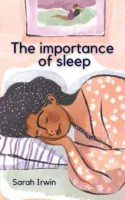Sleep. It’s something we all do and need and (if you’re like me) complain the most about not getting enough of. Despite this, I can never seem to switch off Netflix or pull myself out of the never-ending rabbit hole which is YouTube despite how many times I’ve told myself I need to get an early night. Even while I was at school, I was terrible at managing my sleep time. I was either putting off going to bed, or I was chained to my desk all night, desperate to complete my work before the following morning came. It’s only been recently that I’ve really started to prioritise my sleep schedule, even if that means not completing what I intended to have done before the following day. What I’ve learnt from educating myself on the importance of sleep is too important to simply keep to myself, and I felt compelled to share my newfound knowledge with other youth like me.
Sleep provides a foundation for a healthy mind. As a young adult, the recommended amount of time you need is between 7-9 hours of sleep per night. Contrary to popular belief, you CANNOT catch up on sleep. Say you are aiming to sleep for 8 hours per night, but for whatever reason end up sleeping for six. If you sleep for ten hours the following night, this does not mean you have now “caught up” those two hours you lost out on the previous night. Even one night of decreased sleep can affect physical and cognitive functioning. It takes approximately FOUR NIGHTS of recommended sleeping nights to recover from just one hour of missed sleep.
Four nights of quality sleep to just recover from one hour of missed sleep? Wow! Hearing that definitely made me want to learn more about how necessary sleep is for our day-to-day function. Below are three facts I’ve compiled to share with you to stress why sleep is so so important for us young people.
The link between mental health and sleep
The number of studies showing the link between poor sleep and mental health has been slowly growing in the last decade. Sleep deprivation studies have shown that a lack of sleep within healthy individuals can offset mood disorders such as anxiety and depression. Think about how you’ve felt in the morning after not getting enough sleep. Now imagine you had the same experience every morning for weeks and even months on end. One can easily begin to see how a lack of sleep is a big risk factor for heightened anxiety, sadness, irritability, and decreased cognitive functioning. Unfortunately, a lack of sleep causing poor mental health is a double-edged sword: Poor sleep can produce poor mental health, but at the same time, many mood and sleep disorders produce poor sleep. Hence, a paradox occurs where one must sleep to improve their mental health, but poor mental health could be causing the lack of sleep in the first place! To combat this double-whammy, I have included an example of some ideas to improve one’s “sleep hygiene” at the end of this article.
Sleep is essential for cognitive and physical functioning
Anyone who has ever had to do any big brain work the day after an awful night of sleep is acutely aware that a lack of sleep is a one-track path to total incompetence for the next 24 hours. For everyday functioning, sleep is absolutely essential. Our ability to focus is severely dampened as well as our reflexes and reaction time being impaired. One study has shown that the risk of getting into a car accident increases exponentially for each hour of sleep lost. Sleep provides an opportunity for our mind to consolidate memories and retain newly learned information. Being well-rested allows us to be in control of our emotions and not become victims to unregulated emotional outbursts and heightened stress. As adolescents, sleep is necessary for growth. Growth and development of the body happens during sleep and a lack of it can interrupt this process. A lack of sleep also interferes with our blood sugars, causing us to crave foods such as sugar, carbohydrates, and caffeine.
“It’s difficult trying to get enough sleep,” says Daniel Begg, “I definitely feel an immediate difference in my productivity if I am disciplined about it though…I’m learning to put my sleep before anything else.”
More sleep helps you fight off illness
When your body gets sick, your immune system is responsible for fighting off the germs which make you ill. Ever wondered why you feel tired when you are ill? Our body repairs and fights off illness a lot during sleep. With decreased sleep, your immune system is also compromised. It cannot fight off illnesses as quickly, and you are at risk of getting sick more often.
“Whenever I get sick, my body immediately shuts down,” says Emma Irwin, “forcing myself to be up and productive just sets everything back.”
A Note on Insomnia:
Insomnia is probably the most famous sleep disorder. Insomniacs have difficulty falling and/or staying asleep. There is no specific number of hours insomniacs sleep as it varies from individual. Most people who suffer from insomnia are prescribed medication to help them fall and stay asleep. However, in the long term, it’s much better for your body to sleep naturally. Here are some tips to help:
Step One: Stimulus Control:
Your bed is only for sleeping. Do not do anything else in your bed except sleep. If you cannot fall asleep within 20 minutes, get out of your bed and only return once you feel tired enough to fall asleep.
Step Two: Sleep Consolidation:
Go to bed at the same time every night – and get up at the same time every morning. This helps to establish a routine for your body to adapt to. Your body will naturally start to feel tired at your sleep time.
Step Three: Sleep hygiene
Avoid over-stimulation and caffeinated food and drink an hour before bed. Try not to look at any source of blue-emitting light (I.e., your phone, computer, and TV). Instead, do calming and screen-free activities such as reading.
Tell us: what are your tips to ensure a good night’s sleep?



